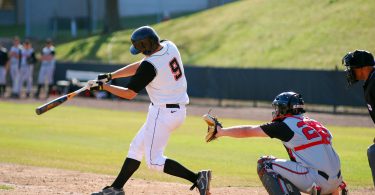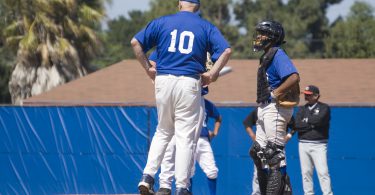By now, you realize that there is a lot more to being a college baseball player than what is recorded in a box score. College baseball players juggle many responsibilities and, at most programs across the country, coaches describe schoolwork and baseball as priorities 1a and 1b. While we spend a lot of time addressing what it takes to be a successful college baseball player on the field, in this mini-series, we shift our attention to academics. If you are familiar with our resources at KPB, you know that our focus on academics is nothing new. We have over a dozen academic support articles and spend a lot of time sharing advice on how players can balance baseball and academics at the college level.
In this first part of a 4-part series, we start off by giving an overview of the academic support services available to college baseball players. In part 2, we’ll give an overview of the way the NCAA defines learning disabilities (education-impacting disabilities) and the impact the definition has on recruits with learning disabilities. In part 3, we look at the way recruits with learning disabilities can account for and successfully address their unique needs in the recruiting process. We finish the mini-series by addressing how players with learning disabilities can effectively transition to college, take advantage of campus resources for students with disabilities, and continue to have academic success. There is a lot to cover, so let’s jump right into our overview of academic support services to college baseball players.
Academic Support for Baseball Programs: An Overview
When I was a D1 recruiting coordinator, about 4 out of every 5 parents who came on a campus visit would ask about the academic resources and support their son would receive if he came to play for us. It’s an incredibly common question in the recruiting process, and it should be! First and foremost, you go to college as a student to learn, challenge yourself intellectually, and grow as a person. There are times when you will need help, especially as you try to juggle a baseball schedule that can feel like a full time job on its own.
Luckily, nowadays nearly every college baseball team has some sort of academic support to help players have success in their scholarly pursuits. As a recruit, however, you should never make assumptions about the resources that a particular program has to offer. Always ask for details about the academic support resources provided to baseball players at programs you are considering because each school will be unique in the support they offer to their student-athletes. At programs with smaller budgets, the coach may double as the academic support person. This may work for you if all you need is someone to oversee your study hall and remind you to get your work done, but if you need more substantial or regular help, you are going to want to make sure that the program’s resources meets your needs before you show up on campus as first year player. On the other end of the academic resource spectrum, some programs will have a designated academic advisor or team of advisors whose entire job is to look after the baseball team and ensure that players have the support they need for academic success. This is the best case scenario.
You are probably beginning to see that being a student-athlete has academic advantages built in. Generally speaking, academic help for student-athletes is readily available, if not directly built into their program and schedule. Other common academic benefits to student-athletes often include priority registration (being able to sign up for classes first to ensure that they fit with the athletic schedule) and oversight from an advisor or coach ensuring that the class schedule meets eligibility and progress to graduation requirements. For recruits with learning disabilities or who think they will need more academic support, the availability of the resources and support described above may be a top priority in the search for a program fit. If this sounds like you, you should ask a lot of questions and have coaches connect you directly to the academic support people who can often answer specific questions about on-campus resources better than the coaches.
Even with the extra help provided for athletes at many colleges, the responsibility for good grades falls on the student-athlete, who must be in-tune with expectations and requirements. This starts in recruitment. As you go through the recruiting process, make it a point to develop a clear understanding of the academic resources available at each program and how that fits with your needs and plan. We close out this article with 5 questions you can ask college coaches to help determine whether the academic support available to their team is right for you.
Five Questions to Ask About Academic Support Services
- Do players have a designated learning specialist or someone who is professionally trained in tutoring and academic advising who is available to help on a regular basis?
- What are some of the academic benefits to being a student-athlete at your school? Will I receive priority registration and help with scheduling my classes?
- Is there subject-specific tutoring available to help me with assignments and projects that I don’t understand?
- Is there mandatory study hall? If so, what are the requirements?
- How do the current players use the academic resources available?
Bonus Question: Can you put me in touch with the academic advisor or support person so I can talk to them about their role working with baseball players?
We hope this gives you a clear picture of what types of academic support are commonly available to college ballplayers. Check back in next week as we continue our college baseball academics mini-series. In Part 2, we discuss the way the NCAA defines learning disabilities and the accommodations and resources available to recruits with learning disabilities.







